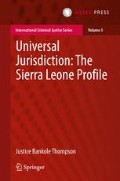Abstract
Any scholarly work on international law would be incomplete without an overview of the sources of this important body of law regulating the conduct of states and other subjects of international law. In effect, to understand the rights, obligations, and liabilities of international entities, knowledge of the normative origins and sources of those rights, obligations, and liabilities is imperative. This is the focus of this chapter.
Access this chapter
Tax calculation will be finalised at checkout
Purchases are for personal use only
Notes
- 1.
Article 38(1) of the Statute of the International Court of Justice is widely recognized as the most authoritative statement as to the sources of international law. It provides as follows: “the Court, whose function is to decide in accordance with international law such disputes as are submitted to it, shall apply: (a) international conventions, whether general or particular, establishing rules expressly recognized by the contesting parties; (b) international custom, as evidence of a general practice accepted as law; (c) the general principles of law recognized by civilized nations; (d) subject to the provision of Article 59, judicial decisions and the teachings of the most highly qualified publicists of the various nations, as subsidiary means for the determination of rules of law.” Shaw 1997, p. 55; Brownlie 1990, p. 3.
- 2.
- 3.
McGinnis 2006, p. 2.
- 4.
Werle 2009, p. 51.
- 5.
Ibid.
- 6.
Robertson 2002, p. 174.
- 7.
Written Reasons for the Trial Chamber’s Oral Decision on the Defence Motion on Abuse of Process due to Infringement of Principles of Nullum Crimen Sine Lege and Non-Retroactivity as to Several Counts, Prosecutor v. Brima Kamara and Kanu, Case No. SCSL-04-16-PT, T.Ch, 31 March 2004, para 33.
- 8.
Decision on Preliminary Motion based on Lack of Jurisdiction (Child Recruitment) Prosecutor v. Norman, case No. SCSL-2004-14AR72(E), A.Ch. 31 May 2004 para 53.
- 9.
Bledsoe and Boczek 1987, pp. 28–29.
- 10.
Idem, p. 29.
- 11.
Idem, p. 29.
- 12.
Idem, p. 29 for a historical perspective of the term, namely, that general principles of law are suggestive of natural law (reason) and refute the arguments of the extreme positivists in favour of the moderate positivists and the eclectics (Grotius). They also resemble the Roman jus gentium (law common to all nations). See also Werle 2009, p. 53 for the view that not every law found in several or all legal systems is automatically a general principle of law and therefore a component of the international legal order.
- 13.
Prosecutor v. Furundzija, ICTY (Trial Chamber), judgment of 10 December 1998, para 178.
- 14.
Cassese 2008, pp. 14–15.
- 15.
Robertson 2002, p. 92.
- 16.
Ibid.
- 17.
Bledsoe and Boczek 1987, p. 29.
- 18.
Statute of the ICJ, Article 39.
- 19.
Shaw 1997, p. 86.
- 20.
ICTY (Appeals Chamber) Judgment of 24 Mach 2000, para 97. Robertson 2002 argues that judicial decisions of international courts may influence international law under three conditions, namely: (1) If they exhibit a striking unanimity of approach to the same question; or (2) If a particular decision has won widespread respect, either for its epic quality (e.g. the Nuremberg Judgment) or for its statement of a new and subsequently accepted principle (e.g. that of compensating victims of crimes against humanity) as in the Velasquez Rodriguez case; or (3) Because of the power and persuasiveness of the actual opinion, even if the result is not widely accepted (e.g. The U.S. Supreme Court Ruling in New York Times v. Sullivan).
- 21.
See Bledsoe and Boczek 1987, p. 30 where they also observe that, notwithstanding the fact that the opinions of legal scholars are a subsidiary source of international law yet, (1) historically, publicists such as Hugo Grotius and Emerich De Vattel created a major influence on the evolution of international law, and (2) that modern legal scholars have also played an important role in international courts’ decisions, as demonstrated by the classic American case of The Paqete Habana; The Lola, 175 U.S. 677 (1900); see also Shaw 1997, p. 98 for the view that with the rise of positivism and the consequent emphasis of state, treaties and customs assume the dominant position in the exposition of the rules of the international system, causing legalistic writings to decline in importance.
- 22.
See Oppenheim as quoted in Jennings et al. 1992, pp. 512–513 for the proposition that “not only is custom the original source of international law, but treaties are the source of the validity and modalities of which themselves derive from customs”.
- 23.
Shaw 1997, p. 73.
- 24.
Bledsoe and Boczek 1987, p. 31.
- 25.
Werle 2009, p. 61.
- 26.
Cassese 2008, pp. 14–15.
References
Bledsoe RL, Boczek B (1987) The international law dictionary. Clio Press Ltd., Oxford
Brownlie I (1990) Principles of public international law, 4th edn. Oxford University Press, Oxford
Cassese A (2008) International criminal law, 2nd edn. Oxford University Press, Oxford
Jennings RY et al (eds) (1992) Oppenheim’s international law, vol 1. Longman, London
McGinnis JO (2006) The comparative disadvantage of customary international law. Harvard J Law Publ Policy 30:1–6
Robertson G (2002) Crimes against humanity: a struggle for global justice, Rev. edn. The New Press, New York
Shaw MN (1997) International law, 4th edn. Cambridge University Press, Cambridge
Werle G (2009) Principles of international criminal law, 2nd edn. T.M.C. Asser Press, The Hague
Author information
Authors and Affiliations
Corresponding author
Rights and permissions
Copyright information
© 2015 T.M.C. Asser Press and the author(s)
About this chapter
Cite this chapter
Thompson, B. (2015). Sources of International Law. In: Universal Jurisdiction: The Sierra Leone Profile. International Criminal Justice Series, vol 3. T.M.C. Asser Press, The Hague. https://doi.org/10.1007/978-94-6265-054-1_2
Download citation
DOI: https://doi.org/10.1007/978-94-6265-054-1_2
Published:
Publisher Name: T.M.C. Asser Press, The Hague
Print ISBN: 978-94-6265-053-4
Online ISBN: 978-94-6265-054-1
eBook Packages: Humanities, Social Sciences and LawLaw and Criminology (R0)


